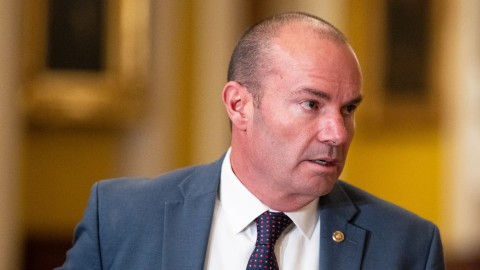A bold political move is unfolding in Washington, where Republican Senator Mike Lee has introduced a sweeping measure called the Interstate Obscenity Definition Act (IODA) that could criminalize pornography across the entire United States. The bill has officially entered committee proceedings, igniting fierce debate over free speech, online content, and the direction of American cultural policy.
This proposal has sparked an unusually intense national conversation. While some see it as a long-overdue update to laws that were created decades ago, others view it as a radical attack on fundamental freedoms. The discussion touches everything from child protection and morality to artistic freedom and digital culture.
What’s in the Interstate Obscenity Definition Act?
A Modernized Definition of Obscenity
The IODA proposes a fundamental overhaul of how obscenity is defined under U.S. law. Traditionally, obscenity was narrowly defined by the Supreme Court’s “Miller Test,” which focused on local community standards, explicit sexual content, and whether the material lacked serious artistic or scientific value. The new law seeks to expand that definition to include any visual content videos, photos, or even text that is intended to arouse sexual interest and lacks serious artistic, literary, political, or scientific value.
The goal is to modernize legal definitions for the digital age, where content is easily accessible across state lines and globally. Supporters argue that the old framework cannot address the realities of social media, streaming platforms, and rapidly evolving adult entertainment websites.
Eliminating Intent as a Requirement
A key element of the bill is the removal of intent as a requirement for prosecution. Under current law, authorities must prove that an individual intentionally distributed obscene material. IODA would make even accidental sharing of certain content potentially criminal. Critics warn that this could lead to overreach, with ordinary users, social media platforms, and even mainstream creators potentially exposed to legal risk.
Why the Proposal Is So Controversial
Threats to Free Speech and Culture
Civil liberties advocates argue that the IODA is dangerously vague. Its broad language could theoretically sweep up not only explicit pornography but also films, television shows, and other cultural content that includes sexual themes. Popular shows and mainstream films could fall under the law’s expansive definition of obscenity. Legal experts warn that such ambiguity threatens First Amendment protections and could set a precedent for over-policing creative content.
Alarm Among Creators and Adult Industry Workers
People working in adult entertainment including online performers, filmmakers, and content creators have expressed serious concerns. They argue that even consensual and relatively mild material could be criminalized, endangering livelihoods and creating uncertainty in an industry that is already heavily regulated. Many creators fear that the law could be used to shut down independent platforms, eroding personal freedom and artistic expression.
Public Backlash and Social Debate
The bill has generated heated debate on social media and in public forums. Advocates for free speech emphasize personal choice, privacy, and the importance of distinguishing between harmful exploitation and adult content produced by consenting adults. Opponents argue that the proposal prioritizes moral policing over constitutional rights, with potential consequences that could extend far beyond its stated objectives.
Supporters Say It's a Long-Overdue Cleanup
Protecting Children and Enforcing Morality
Supporters of the bill argue that the explosion of online adult content has made traditional laws obsolete. They stress that IODA is designed to prevent minors from accessing extreme or harmful material and to create a moral baseline for public content. From their perspective, the law provides law enforcement with tools to tackle the spread of sexually explicit material that is easily shared, downloaded, or streamed across state lines.
Rooted in Broader Conservative Strategy
The bill aligns with a broader conservative agenda seeking to influence cultural norms, particularly around sexuality, media, and family values. Advocates see it as part of a movement to reassert moral standards in public life and curb what they describe as the oversexualization of society, especially online.
What Happens Next in Congress?
Committee Stage Now the Real Debate Begins
The act has moved to the Senate Committee on Commerce, Science, and Transportation, where detailed hearings and revisions are expected. Legislators will examine constitutional concerns, enforcement logistics, and potential impacts on industries and individual creators. The path forward is uncertain, particularly given a closely divided Congress and strong opposition from civil liberties groups.
A Cultural Flashpoint
Even if the bill does not ultimately pass, it has already become a national flashpoint. It has prompted widespread discussion about the balance between protecting society especially children and preserving fundamental freedoms, including freedom of expression and artistic creativity. The debate raises difficult questions about the role of government in regulating sexual content in a digital world.
Broader Implications and International Perspective
The discussion around IODA also highlights a global tension between regulation and personal freedom. Countries around the world struggle with similar challenges how to prevent exploitation, shield minors, and yet allow adults access to content of their choice. Some nations impose strict bans, while others focus on education and parental control. The U.S. proposal may influence international conversations about digital media regulation and internet freedom.
Technology and Enforcement Challenges
Experts warn that enforcing such a law would be extremely difficult. With VPNs, encrypted platforms, and decentralized networks, content could easily bypass geographic restrictions. Law enforcement would face significant technological challenges, and platforms might be forced to implement sweeping content filters, potentially limiting legitimate expression.
The Interstate Obscenity Definition Act represents one of the most ambitious attempts in recent memory to redefine and expand federal control over sexual content online. While supporters argue that it is necessary to protect children and enforce moral standards, critics warn of severe risks to free expression, artistic freedom, and individual privacy. The debate over IODA is about more than pornography; it is a reflection of America’s ongoing struggle to balance moral regulation with constitutional rights in an age of instant digital access.













